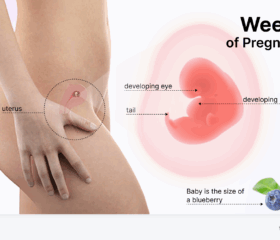Is It Normal to Have Blurry Vision During Pregnancy?
Suddenly, things don't look as sharp as they used to. Is blurry vision normal during pregnancy, or does it indicate a problem you need to see a doctor for?
Vision changes are common during pregnancy, and they often resolve on their own after delivery. However, it’s important to be aware of when blurry vision could signal a serious underlying condition.
Read on to learn about the most common causes of blurry vision during pregnancy, get a few tips on managing it, and find out when you need to seek medical attention.
Is blurry vision normal during pregnancy?
Yes, blurry vision is often normal when you’re pregnant, although it’s probably not the first thing that comes to mind when you think of common pregnancy symptoms. Although it isn’t as famous as pregnancy fatigue or morning sickness, research indicates that around 15% of women experience changes in their vision during pregnancy, so you’re not alone. 1
For most moms, these changes are temporary and relatively minor. However, that doesn’t mean you shouldn’t get checked out. To the contrary, you should always discuss any sudden and significant changes in your vision with your doctor to rule out potential complications.
When does blurry vision usually begin during pregnancy?
Temporary blurry vision can strike at any point during pregnancy, although it usually occurs in the second trimester or third trimester.
Unfortunately, your vision might not immediately clear up after birth. If you’re breastfeeding, the hormones that help your body produce milk can reduce your tear production, which can lead to dry eyes.
You also lose a lot of water when nursing, and the resulting dehydration can cause dry eyes. Do your best to drink lots of water!
What causes blurry vision during pregnancy?
In some cases, blurry vision can be a symptom of a serious condition like diabetes (including gestational diabetes), preeclampsia, or kidney disease. 2 3 4
If you already had a preexisting condition affecting your vision, such as diabetic retinopathy or Graves’ disease (a disorder of the thyroid), pregnancy can also worsen your symptoms. 5
This isn’t necessarily the most likely explanation—there are also many benign possibilities, listed below. However, many of the conditions listed above are serious and require prompt medical attention to protect you and your baby’s health.
This doesn’t mean that if your vision’s a little blurry, you need to be alarmed. It’s just good to be aware of the possibilities, and if your vision changes are especially sudden or severe, get yourself checked out promptly.
Benign reasons for blurry vision in pregnancy
If it turns out that there’s nothing serious causing your vision changes, it’s possible that the culprit is none other than your fluctuating hormones. These can cause changes in your eyes (and the rest of your body), such as: 6
- Changes to your cornea: Hormonal changes can alter the thickness and curvature of your cornea (the transparent dome-shaped layer protecting your eyes). These changes affect how your eyes process light and can potentially cause mild blurriness.
- Fluid retention: If you’ve been dealing with swollen feet and ankles during pregnancy, then you know that fluid retention (edema) is no joke. Fluid can also build up in your eyes, which alters the shape of your corneas and affects your vision.
- Dry eyes: On the flip side, hormonal shifts can also reduce your natural tear production, which can lead to your eyes feeling dry and irritated. This dryness can contribute to blurry vision and discomfort. If you already have dry eye syndrome, expect a flare-up while you’re pregnant or breastfeeding. 7
- Headaches: Thanks to those pesky hormones, it’s not uncommon for women to suffer from headaches while they’re pregnant. If you develop a migraine, you may become sensitive to light or loud noises. You may also have “auras,” during which you may see lines or flashing lights, also called kaleidoscope or pixelated vision. 8 9
If you wear contact lenses, these changes may make wearing them intolerable. Fortunately, that will go back to normal after you give birth.
It’s worth noting that because all of this can affect your vision so much, if you’re planning to get new glasses or contacts, you may need to wait for several weeks after having your baby before getting a prescription so that your symptoms can subside.
How can you manage blurry vision during pregnancy?
Since your hormones play a big part in your changing vision, you may not be able to entirely prevent blurry vision during pregnancy. However, there are several things you can do to manage the symptom: 4
- Use artificial tears: Most eye drops are safe during pregnancy, but don’t just use any over-the-counter products. Consult your doctor or eye care provider for recommendations on pregnancy-safe options to keep your eyes moist and comfortable. Avoid medicated versions for now.
- Adjust your workspace: Ensure your computer screen is at a comfortable distance (20–26 inches from your face) and slightly below eye level to minimize eye strain. Use a matte screen filter and turn the computer screen away from the glare from windows or overhead lights. 10
- Consider glasses: Again, if contact lenses become uncomfortable, switch to glasses temporarily.
- Stay hydrated: Drinking plenty of water can help reduce your dry eye symptoms. A balanced pregnancy diet full of fresh fruit and veggies can also help. You can keep the air from getting too dry with a humidifier, but ensure you clean or sterilize it with each use.
Follow the 20-20-20 rule to give your eyes a break from screens
As you probably know, staring at computer screens, phones, or other digital devices for extended periods can strain your eyes and worsen blurry vision. 11 Follow the 20-20-20 rule: every 20 minutes, look at something 20 feet away for 20 seconds. Blink every so often to keep your eyes moisturized, too. 10 Set a timer if you need.
When should you see your doctor about your vision during pregnancy?
Most cases of blurry vision during pregnancy are harmless, but you should seek medical attention if you experience sudden or painful changes, such as: 12 13
- Particularly sudden or severe blurriness
- Double vision
- Temporary loss of vision
- Eye pain
- Light sensitivity
- Severe headaches
- Flashes of light or floaters in your vision
Seek medical attention immediately if these symptoms are accompanied by swelling in your face, hands, or feet, along with upper abdominal pain, nausea or vomiting, and excessive thirst or frequent urination.
Again, this could indicate serious issues like diabetes or preeclampsia (especially if you’re in your second or third trimester) or other conditions that require prompt diagnosis and treatment. 14 2 3
On that note, use your journal or a pregnancy tracker app to monitor the onset, severity, and duration of your symptoms (not just the ones related to your vision) so that your doctor can have a better idea of what’s affecting your eyesight.
Final thoughts
Thankfully, blurry vision during pregnancy is often just a temporary inconvenience. Still, it can also be caused by potentially dangerous health conditions, and it’s a good idea to see your doctor if it comes on suddenly or if it’s particularly severe.
In the meantime, practice good eye care habits, and hang in there!
Article Sources
- Deutsches Ärzteblatt International. "Ocular Changes During Pregnancy" Retrieved November 14, 2025.
- University of Utah Health. "Hormones and Eye Health: What Women Need to Know" Retrieved November 14, 2025.
- Cleveland Clinic. "Gestational Diabetes" Retrieved November 14, 2025.
- Healthline. "What Causes Dry Eyes During Pregnancy, and How Can You Get Relief?" Retrieved November 14, 2025.
- Healthline. "Seeing Stars and Other Vision Changes During Pregnancy" Retrieved November 14, 2025.
- American Academy of Ophthalmology. "Ocular Changes in Pregnancy" Retrieved November 14, 2025.
- Harvard Health Publishing. "Dry eye syndrome" Retrieved November 14, 2025.
- Utah Department of Health & Human Services. "Headaches during pregnancy" Retrieved November 14, 2025.
- Cleveland Clinic. "Kaleidoscope Vision" Retrieved November 14, 2025.
- Harvard Health Publishing. "Effective tips for reducing eye strain" Retrieved November 14, 2025.
- American Academy of Ophthalmology. "Computers, Digital Devices, and Eye Strain" Retrieved November 14, 2025.
- Preeclampsia Foundation. "Signs & Symptoms" Retrieved November 14, 2025.
- U.S. Centers for Disease Control and Prevention. "Signs and Symptoms of Urgent Maternal Warnings Signs" Retrieved November 14, 2025.
- Cleveland Clinic. "Preeclampsia" Retrieved November 14, 2025.







